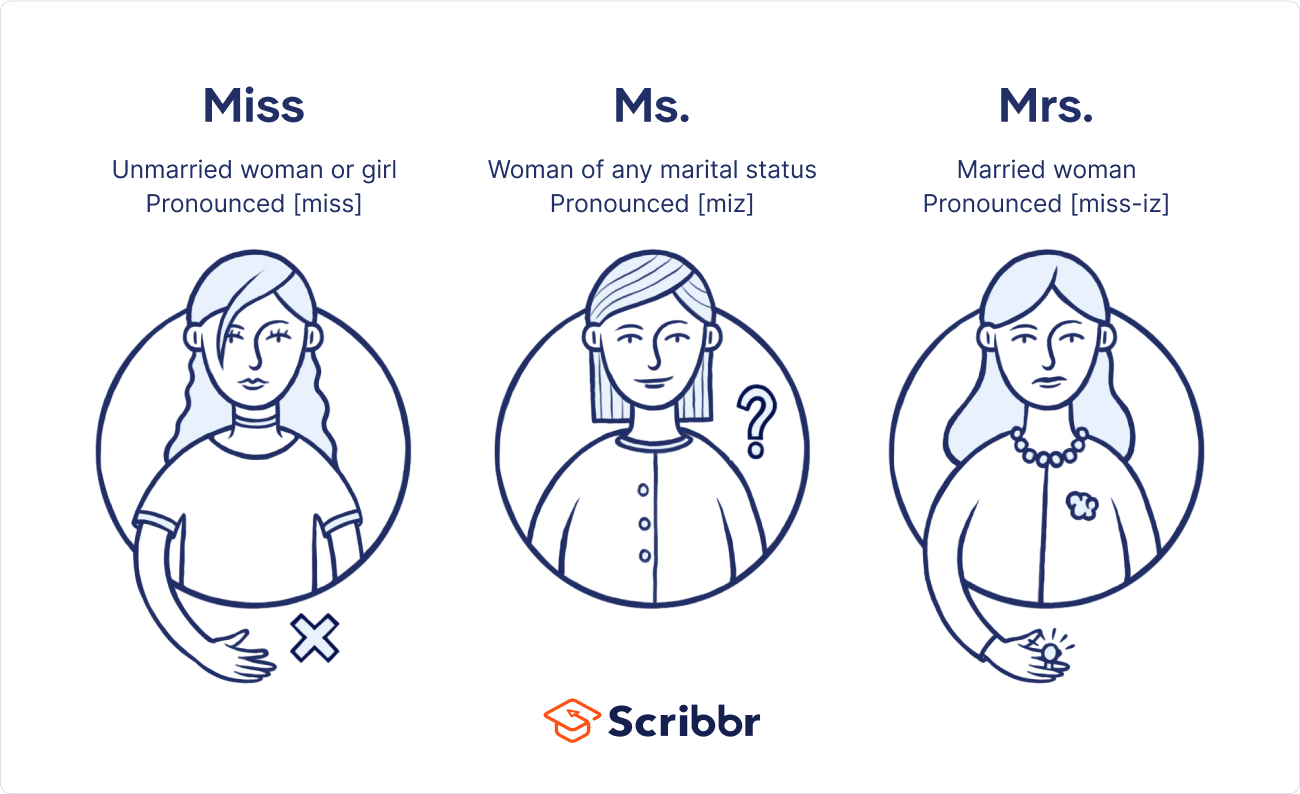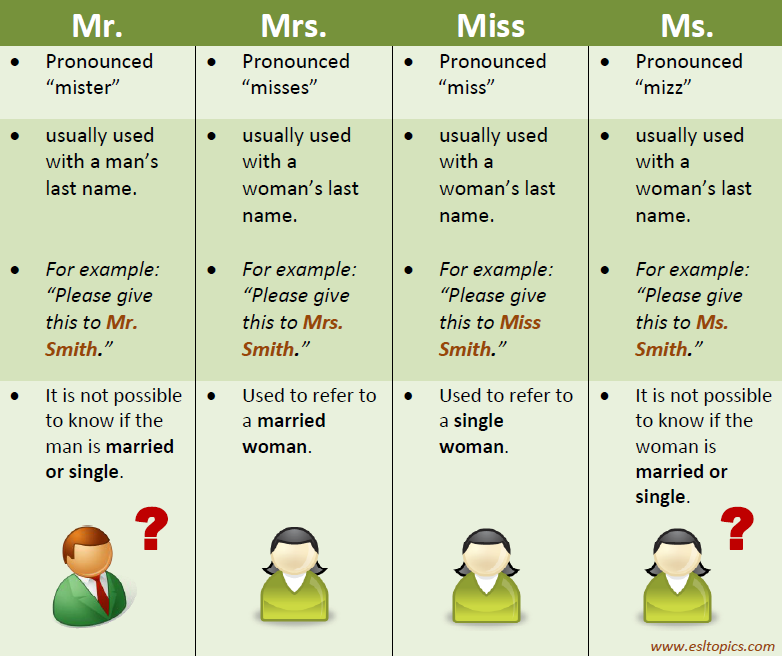
Difference Between Mr. Mrs. Miss Ms. and Mx. YouTube
The abbreviation Mr. comes from Middle English, where it was the abbreviation of maister, meaning "master." Master was the original preferred title for young unmarried men, and mister was specific to those who were married, until the former fell out of use and the latter came to apply to both.. Mrs. is the abbreviation for mistress, a word that once mainly referred to the female head of a.

Mr., Mrs. और Miss का सही उपयोग जानें Daily Learning hinkhoj YouTube
Miss is typically reserved for young, unmarried women; use Ms. if Miss feels too juvenile, but the woman is also unmarried. Mrs. is used for married women only—and Mx. has become the honorific.

when should you use miss , mrs or ms English fun, Learn english
Mr. and Mrs. are pronounced the same as their longer forms: Mr. is pronounced as [ mis -ter ] and Mrs. is pronounced as [ mis -iz ] or [ miz -iz ] in the Northern United States and as [ miz -iz ] and [ miz ] in the Southern United States. Mr. and Mrs. are typically used as titles or honorifics before a person's name to show respect.

Ms vs Mrs vs Miss Which One to Use in 2023? AtOnce
Mr. (Mister) is the male equivalent of both Ms. and Mrs., whereas Master (for a boy) is the male equivalent of Miss. What does Ms. Mean? Ms. is a relatively new word. It became popularized in the 1950s, at a time when the world became more conscious of feminist issues.
Craic On » Mr and Mrs MUFF!
Yes, you would be correct to capitalize a person's professional title or form of address within a sentence (e.g., Mr., Mrs., Dr., Prof.).In the case of "Mr.," you would follow the courtesy title with the initial or the full first name and the surname (e.g., Mr. J. Smith, Mr. John Smith) or the abbreviated title and the surname alone (Mr. Smith).

Mr. Mrs. Miss Ms. The crazy teacher's blog The crazy teacher's blog
Ms. is the female equivalent of the male Mr. Just as Mr. can be used for both married and unmarried men, Ms. can be used for both married and unmarried women. Ms. should also be followed by the person's surname, like Ms. Frizzle. It is important to note, however, that Ms. is not the same as Miss, which is a title for a young, unmarried woman.

mrs vs ms what is the difference between miss mrs and ms when to use
In the English language, an honorific is a form of address conveying esteem, courtesy or respect. These can be titles prefixing a person's name, e.g.: Mr, Mrs, Miss, Ms, Sir, Dame, Dr, Cllr, Lady, or Lord, or other titles or positions that can appear as a form of address without the person's name, as in Mr President, General, Captain, Father, Doctor, or Earl.

How to Use Personal Titles Mr., Mrs., Ms. and Miss ESL Buzz
The abbreviation Mrs. has been in use since the sixteenth century, it is a variant of the word mistress. Ms. Ms. is a title used before a surname or full name of a female whether she is married or not. Ms. has been in use since the 1950s, it is a portmanteau of the words Miss and Missus.

Miss Vs Ms. Vs Mrs. When To Address A Woman By Mrs., Ms., And Miss 7
Knowing the difference between 'Mr.', 'Miss', 'Mrs.' and 'Ms.' is very important if we want to show respect for others. There are basic rules for their uses, but they are flexible. When referring to women, for example, it is important to know their preferences. They will feel more respected and more comfortable with you if you.

Difference Between Mr Mrs Miss And Ms Commonly Confused Words Otosection
Mrs. is a traditional title used for a married woman. Miss is a traditional title used for an unmarried woman. Mx. is a title that indicates neither marital status nor gender. Uses of Miss Miss, when attached to a name, is a traditional title of respect for a girl or unmarried woman.

Theiss Druck Mr & Mrs
Mr. Mrs. Miss 和 Ms. 这四个看起来非常相似的单词该如何区分呢?今天Cathy就来聊聊这四个称谓。 Part 1 Mr.Mr. /Mr /ˈmɪstə/ (先生) 是Mister /ˈmɪstə/的缩写形式,在英式英语中常常不用加点写成Mr,而在美…

What's the Difference Between Miss, Ms., and Mrs.?
By comparison, the traditional honorifics of Miss, Mrs, Ms and Mr all indicate the binary gender of the individual. These titles are used to avoid specifying gender for: persons who wish not to indicate a gender (binary or otherwise) persons for whom the gender is not known persons whose biological sex is not on the gender binary (intersex)

Ms And Mrs nokil
We use titles like "Miss," "Mrs.," "Ms.," and "Mr." when using someone's first name could sound too familiar. For instance, when addressing someone you don't know well, you might say "Dear Ms. Turner" rather than "Dear Sophie.". But there are rules about how to use these titles in your writing. The male honorifics.

Ingilizce Ünvanlar MR. MISS. MRS. MS. FORMAL TITLES YouTube
Mrs. (pronounced [ miss -iz]) is used to address a married woman of any age. Miss (pronounced [miss]) is used to address a young unmarried woman or girl. Instantly correct all language mistakes in your text Be assured that you'll submit flawless writing. Upload your document to correct all your mistakes. Table of contents Miss vs. Ms.

TITLES (Mr. Miss, Ms, Mrs.) (b/w version included) 2/3 ESL worksheet
Miss Berry - We use 'Miss' when addressing young unmarried women. Mrs. Berry - We use 'Mrs.' when addressing a married woman. Ms. Berry - We use 'Ms.' when addressing a woman whose marital status is unknown or unimportant. Madam - We use 'Madam' when addressing a woman in an exceptionally formal situation. (Not common.

Миссис или мисс обращение в английском языке mr, ms, mrs или miss
What about Ms., Mrs. and Mr.? Are there gender-neutral options for those? Fortunately, there are! If you need to refer to someone who prefers gender-neutral pronouns in a formal context, you can.